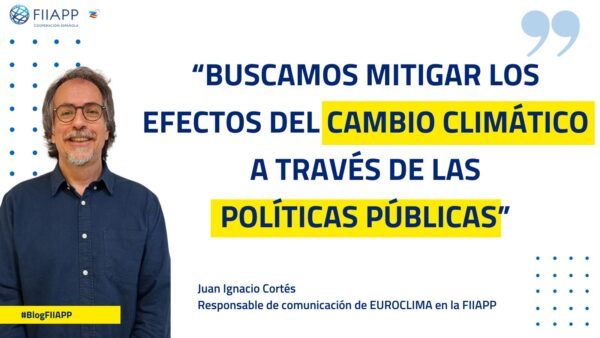-
25 April 2024
Category : Inf first person
Under the volcano: seeking solutions to the climate crisis in Antigua Guatemala

Leaning on the railing of the upper floor of the cloister of the Centro de Formación de la Cooperación Española in Antigua Guatemala, I contemplate a beautiful spectacle.
Looking up, I can see the summit of the Fuego volcano, one of the three volcanoes (Fuego, Agua and Acatenango) that surround what was the capital of the Captaincy General of Guatemala until 1773, when the Santa Marta earthquakes destroyed the city for the third time in a century, looming over the roofs of this beautiful building, which was once a Jesuit convent.
Downstairs, among the pretty arcades of the courtyard, my colleagues from the Euroclima Programme – a colourful and diverse group of people from all corners of Europe, Latin America and the Caribbean – move from one huddle to another in a lively mix of choreography and conversation.
Watching all this in the quiet evening, I think it makes perfect sense that the Annual Meeting of the Euroclima Programme is taking place in this beautiful colonial town of Antigua Guatemala.
On the one hand, the history of the place and the ruins of churches shattered by successive earthquakes that adorn its corners remind us of the destructive force that nature can have. At the same time, the fact that Antigua is still standing, despite everything, is an example of the resilience of the people of Guatemala.
All this immediately brings me back to the issue that concerns us colleagues from the various European cooperation institutions and United Nations agencies that implement the Euroclima Programme and our Latin American and Caribbean counterparts: to find ways, through appropriate and relevant public policies, to mitigate the effects of climate change on the countries of Latin America and the Caribbean and adapt to climate changes that are already irreversible, promoting sustainability and resilience of societies in the region.
On the other hand, I feel that the history of this mestizo country is also reflected in what we have experienced during these days in the halls of the Spanish Cooperation Training Centre in Antigua: an exchange and dialogue between groups of people of different races and cultures who are beginning to travel a path together, without forgetting their past trajectories, but fundamentally looking forward, towards a common goal.
This is particularly evident at this year’s Annual Meeting of the Euroclima Programme, as for the first time 14 Caribbean countries are formally participating in the meeting. The Caribbean enlargement has made the Euroclima family, as we like to call ourselves, an even more heterogeneous group of 33 countries.
More heterogeneous… and more ambitious
Because at Euroclima, we are constantly taking on new objectives to tackle the three interrelated planetary crises that threaten the survival of human life on the planet: climate change, biodiversity loss and pollution.
Therefore, in 2023 we broadened our thematic focus to include priorities beyond climate change mitigation and adaptation issues, with particular significance being given to issues related to the circular economy and strengthening biodiversity conservation and ecosystems, always with a focus on inclusiveness, human rights and gender.
In addition to geographical and thematic expansion, two elements were particularly significant for Euroclima in 2023: the relaunch of relations between the European Union and Latin America and the Caribbean following the EU-CELAC summit that took place in July 2023, and the launch of the European Strategy Investment Agenda “Global Gateway”, which will allow Euroclima not only to drive improvements in climate policies, but also to facilitate the implementation of ambitious infrastructure projects to advance the region’s green transition.
These new ambitions are backed by the EUR 100 million (EUR 50 million already granted and EUR 50 million in the process of being approved) which the European Union has entrusted to the Euroclima Programme to manage over the next few years. This is a serious responsibility indeed.
All these questions float on the wind of this peaceful evening. The sun is starting to set and I think it’s all good. The challenges and the responsibility are great, but so is, as the director of the FIIAPP’s Development and Environment Department, Sonsoles Mories, stated just a few minutes ago at the closing ceremony of the meeting, our commitment.
The views and opinions expressed in this blog are the sole responsibility of the person who write them.






